Analysis of Entrepreneurship and Small Business Management: A Report
VerifiedAdded on 2020/10/23
|15
|4012
|474
Report
AI Summary
This report provides a comprehensive overview of entrepreneurship and small business management, delving into various aspects of the field. It begins by defining entrepreneurship and exploring different types of entrepreneurial ventures, including small businesses, scalable enterprises, large companies, and social enterprises, along with the roles of owner-managers and intrapreneurs. The report then examines the typologies of entrepreneurship, such as male and female entrepreneurs, and their relationship with entrepreneurial ventures. It further analyzes the similarities and differences between these ventures, focusing on their purpose, scale, and characteristics. The report also interprets relevant data and statistics to illustrate the impact of micro and small businesses on the economy, highlighting their contribution to job creation and economic growth. Additionally, it emphasizes the importance of small businesses and startups in fostering social economy, underscoring their role in improving living standards, creating jobs, and driving economic growth. Finally, the report identifies the key characteristics, traits, and skills that distinguish successful entrepreneurs from other business managers, using Mark Zuckerberg and Jeff Bezos as examples.

Entrepreneurship and
Small Business
Management
Small Business
Management
Paraphrase This Document
Need a fresh take? Get an instant paraphrase of this document with our AI Paraphraser
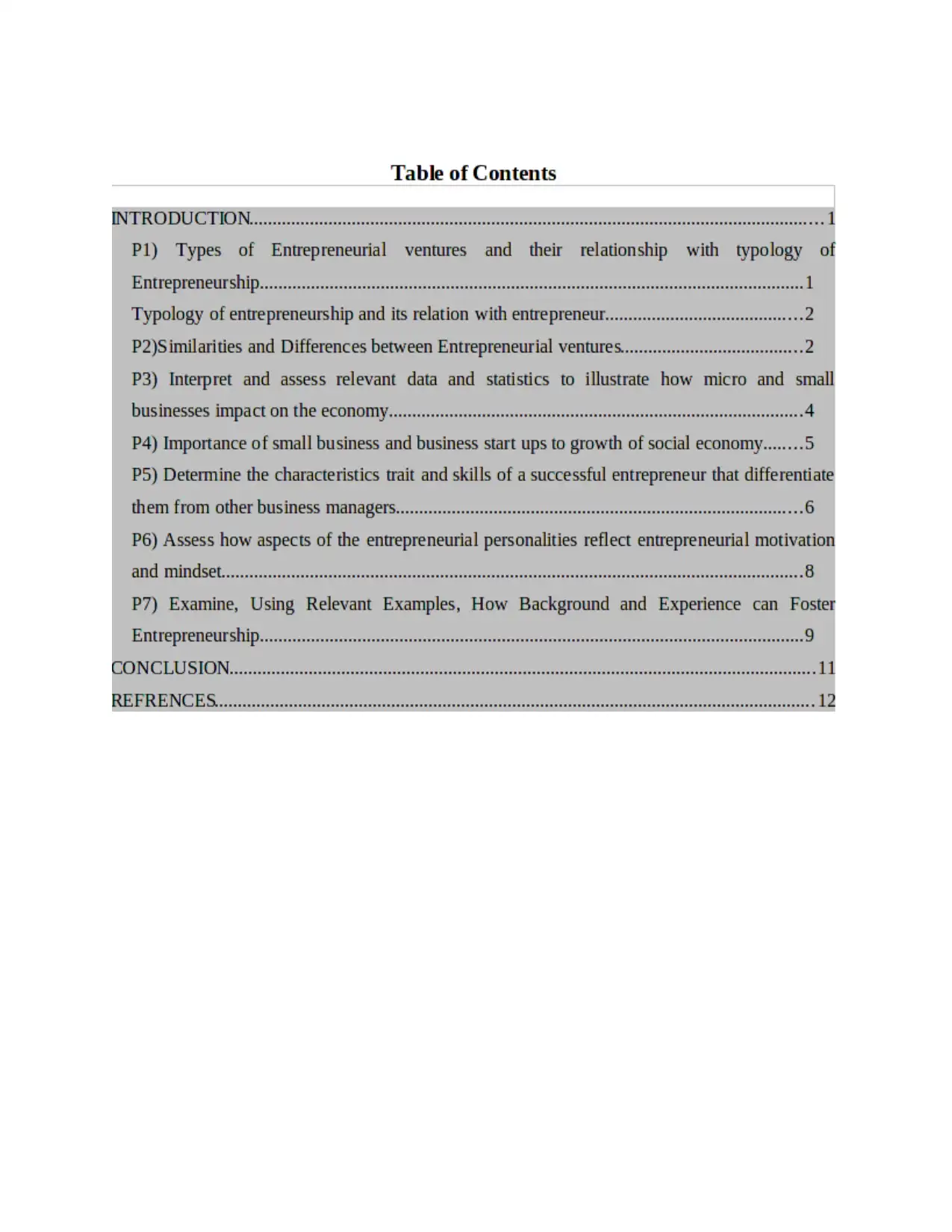

⊘ This is a preview!⊘
Do you want full access?
Subscribe today to unlock all pages.

Trusted by 1+ million students worldwide
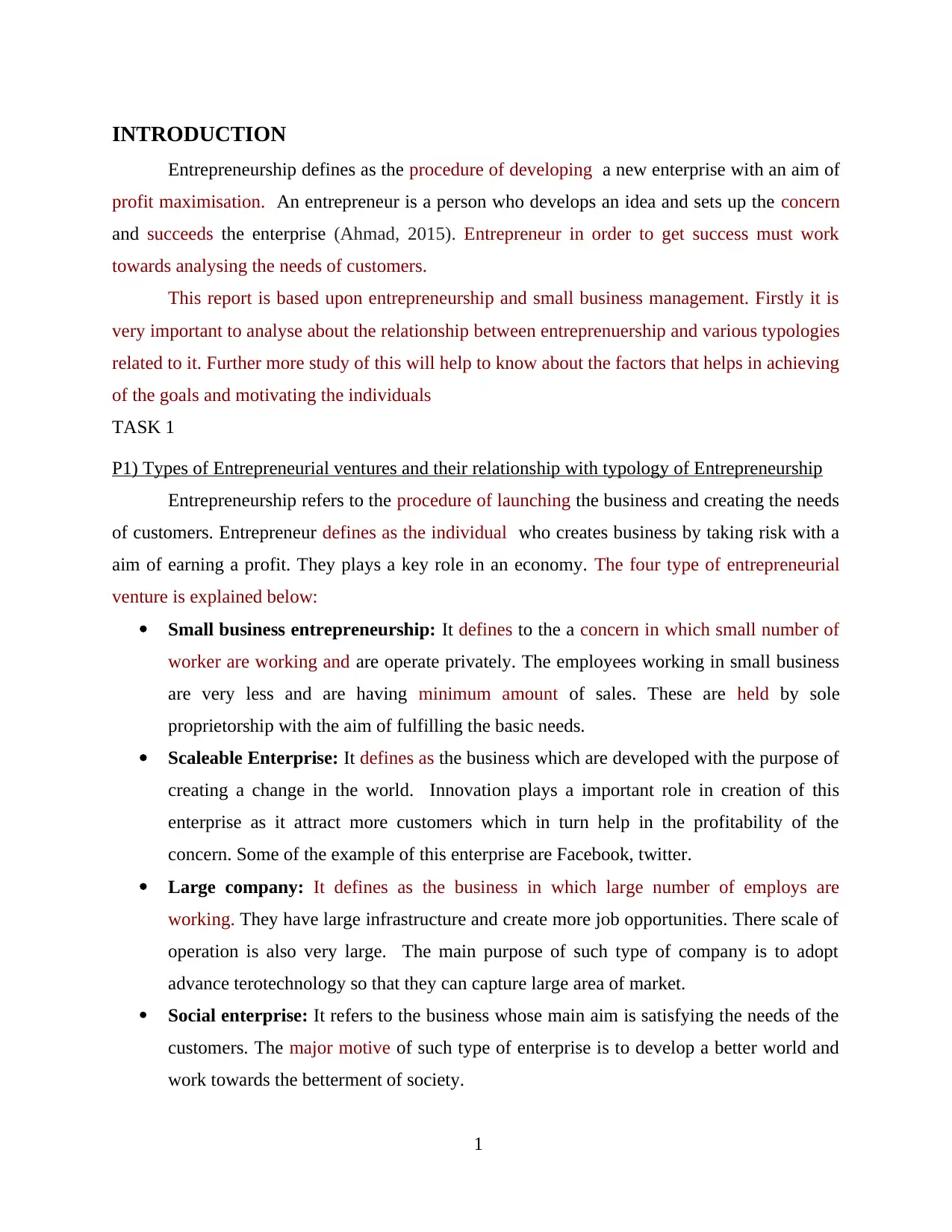
INTRODUCTION
Entrepreneurship defines as the procedure of developing a new enterprise with an aim of
profit maximisation. An entrepreneur is a person who develops an idea and sets up the concern
and succeeds the enterprise (Ahmad, 2015). Entrepreneur in order to get success must work
towards analysing the needs of customers.
This report is based upon entrepreneurship and small business management. Firstly it is
very important to analyse about the relationship between entreprenuership and various typologies
related to it. Further more study of this will help to know about the factors that helps in achieving
of the goals and motivating the individuals
TASK 1
P1) Types of Entrepreneurial ventures and their relationship with typology of Entrepreneurship
Entrepreneurship refers to the procedure of launching the business and creating the needs
of customers. Entrepreneur defines as the individual who creates business by taking risk with a
aim of earning a profit. They plays a key role in an economy. The four type of entrepreneurial
venture is explained below:
Small business entrepreneurship: It defines to the a concern in which small number of
worker are working and are operate privately. The employees working in small business
are very less and are having minimum amount of sales. These are held by sole
proprietorship with the aim of fulfilling the basic needs.
Scaleable Enterprise: It defines as the business which are developed with the purpose of
creating a change in the world. Innovation plays a important role in creation of this
enterprise as it attract more customers which in turn help in the profitability of the
concern. Some of the example of this enterprise are Facebook, twitter.
Large company: It defines as the business in which large number of employs are
working. They have large infrastructure and create more job opportunities. There scale of
operation is also very large. The main purpose of such type of company is to adopt
advance terotechnology so that they can capture large area of market.
Social enterprise: It refers to the business whose main aim is satisfying the needs of the
customers. The major motive of such type of enterprise is to develop a better world and
work towards the betterment of society.
1
Entrepreneurship defines as the procedure of developing a new enterprise with an aim of
profit maximisation. An entrepreneur is a person who develops an idea and sets up the concern
and succeeds the enterprise (Ahmad, 2015). Entrepreneur in order to get success must work
towards analysing the needs of customers.
This report is based upon entrepreneurship and small business management. Firstly it is
very important to analyse about the relationship between entreprenuership and various typologies
related to it. Further more study of this will help to know about the factors that helps in achieving
of the goals and motivating the individuals
TASK 1
P1) Types of Entrepreneurial ventures and their relationship with typology of Entrepreneurship
Entrepreneurship refers to the procedure of launching the business and creating the needs
of customers. Entrepreneur defines as the individual who creates business by taking risk with a
aim of earning a profit. They plays a key role in an economy. The four type of entrepreneurial
venture is explained below:
Small business entrepreneurship: It defines to the a concern in which small number of
worker are working and are operate privately. The employees working in small business
are very less and are having minimum amount of sales. These are held by sole
proprietorship with the aim of fulfilling the basic needs.
Scaleable Enterprise: It defines as the business which are developed with the purpose of
creating a change in the world. Innovation plays a important role in creation of this
enterprise as it attract more customers which in turn help in the profitability of the
concern. Some of the example of this enterprise are Facebook, twitter.
Large company: It defines as the business in which large number of employs are
working. They have large infrastructure and create more job opportunities. There scale of
operation is also very large. The main purpose of such type of company is to adopt
advance terotechnology so that they can capture large area of market.
Social enterprise: It refers to the business whose main aim is satisfying the needs of the
customers. The major motive of such type of enterprise is to develop a better world and
work towards the betterment of society.
1
Paraphrase This Document
Need a fresh take? Get an instant paraphrase of this document with our AI Paraphraser
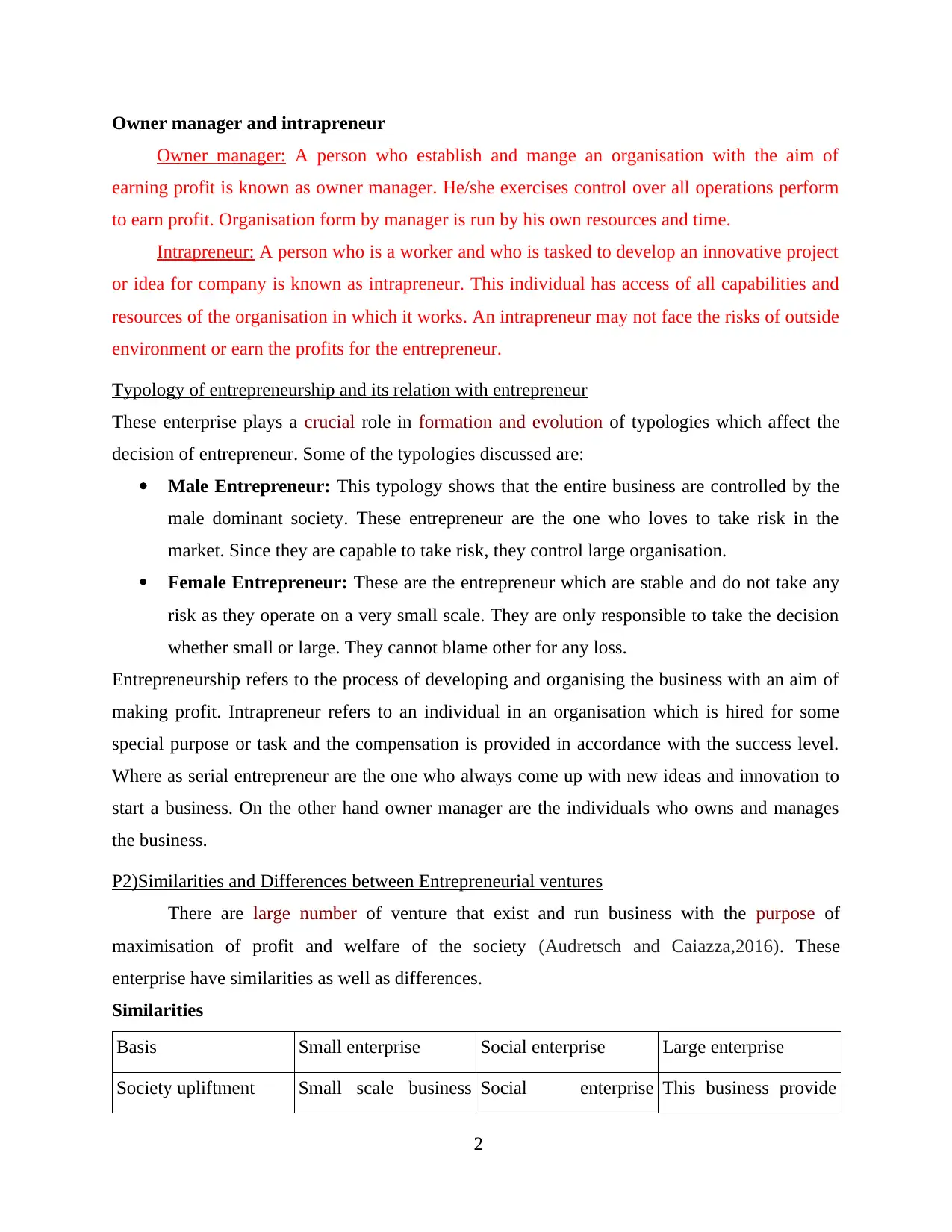
Owner manager and intrapreneur
Owner manager: A person who establish and mange an organisation with the aim of
earning profit is known as owner manager. He/she exercises control over all operations perform
to earn profit. Organisation form by manager is run by his own resources and time.
Intrapreneur: A person who is a worker and who is tasked to develop an innovative project
or idea for company is known as intrapreneur. This individual has access of all capabilities and
resources of the organisation in which it works. An intrapreneur may not face the risks of outside
environment or earn the profits for the entrepreneur.
Typology of entrepreneurship and its relation with entrepreneur
These enterprise plays a crucial role in formation and evolution of typologies which affect the
decision of entrepreneur. Some of the typologies discussed are:
Male Entrepreneur: This typology shows that the entire business are controlled by the
male dominant society. These entrepreneur are the one who loves to take risk in the
market. Since they are capable to take risk, they control large organisation.
Female Entrepreneur: These are the entrepreneur which are stable and do not take any
risk as they operate on a very small scale. They are only responsible to take the decision
whether small or large. They cannot blame other for any loss.
Entrepreneurship refers to the process of developing and organising the business with an aim of
making profit. Intrapreneur refers to an individual in an organisation which is hired for some
special purpose or task and the compensation is provided in accordance with the success level.
Where as serial entrepreneur are the one who always come up with new ideas and innovation to
start a business. On the other hand owner manager are the individuals who owns and manages
the business.
P2)Similarities and Differences between Entrepreneurial ventures
There are large number of venture that exist and run business with the purpose of
maximisation of profit and welfare of the society (Audretsch and Caiazza,2016). These
enterprise have similarities as well as differences.
Similarities
Basis Small enterprise Social enterprise Large enterprise
Society upliftment Small scale business Social enterprise This business provide
2
Owner manager: A person who establish and mange an organisation with the aim of
earning profit is known as owner manager. He/she exercises control over all operations perform
to earn profit. Organisation form by manager is run by his own resources and time.
Intrapreneur: A person who is a worker and who is tasked to develop an innovative project
or idea for company is known as intrapreneur. This individual has access of all capabilities and
resources of the organisation in which it works. An intrapreneur may not face the risks of outside
environment or earn the profits for the entrepreneur.
Typology of entrepreneurship and its relation with entrepreneur
These enterprise plays a crucial role in formation and evolution of typologies which affect the
decision of entrepreneur. Some of the typologies discussed are:
Male Entrepreneur: This typology shows that the entire business are controlled by the
male dominant society. These entrepreneur are the one who loves to take risk in the
market. Since they are capable to take risk, they control large organisation.
Female Entrepreneur: These are the entrepreneur which are stable and do not take any
risk as they operate on a very small scale. They are only responsible to take the decision
whether small or large. They cannot blame other for any loss.
Entrepreneurship refers to the process of developing and organising the business with an aim of
making profit. Intrapreneur refers to an individual in an organisation which is hired for some
special purpose or task and the compensation is provided in accordance with the success level.
Where as serial entrepreneur are the one who always come up with new ideas and innovation to
start a business. On the other hand owner manager are the individuals who owns and manages
the business.
P2)Similarities and Differences between Entrepreneurial ventures
There are large number of venture that exist and run business with the purpose of
maximisation of profit and welfare of the society (Audretsch and Caiazza,2016). These
enterprise have similarities as well as differences.
Similarities
Basis Small enterprise Social enterprise Large enterprise
Society upliftment Small scale business Social enterprise This business provide
2
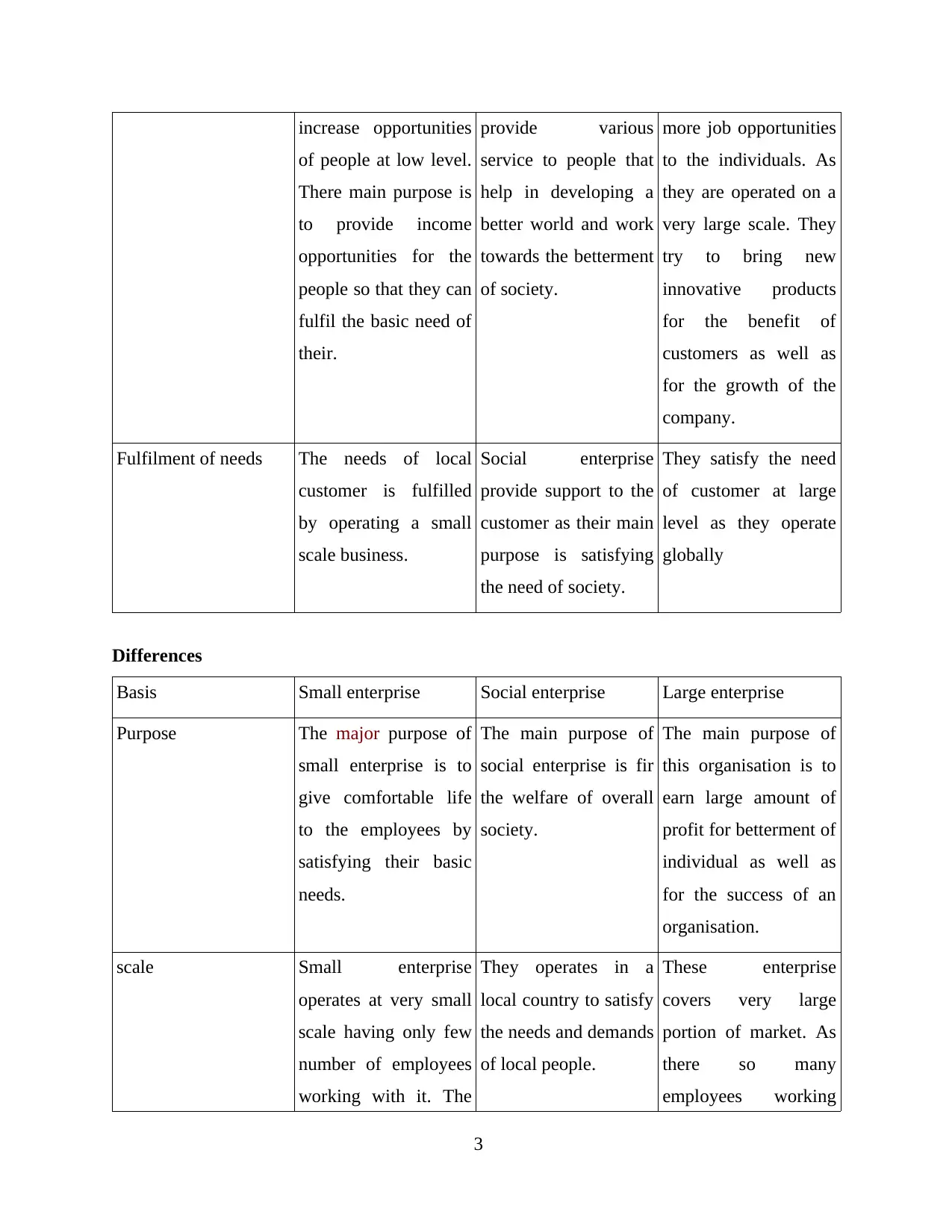
increase opportunities
of people at low level.
There main purpose is
to provide income
opportunities for the
people so that they can
fulfil the basic need of
their.
provide various
service to people that
help in developing a
better world and work
towards the betterment
of society.
more job opportunities
to the individuals. As
they are operated on a
very large scale. They
try to bring new
innovative products
for the benefit of
customers as well as
for the growth of the
company.
Fulfilment of needs The needs of local
customer is fulfilled
by operating a small
scale business.
Social enterprise
provide support to the
customer as their main
purpose is satisfying
the need of society.
They satisfy the need
of customer at large
level as they operate
globally
Differences
Basis Small enterprise Social enterprise Large enterprise
Purpose The major purpose of
small enterprise is to
give comfortable life
to the employees by
satisfying their basic
needs.
The main purpose of
social enterprise is fir
the welfare of overall
society.
The main purpose of
this organisation is to
earn large amount of
profit for betterment of
individual as well as
for the success of an
organisation.
scale Small enterprise
operates at very small
scale having only few
number of employees
working with it. The
They operates in a
local country to satisfy
the needs and demands
of local people.
These enterprise
covers very large
portion of market. As
there so many
employees working
3
of people at low level.
There main purpose is
to provide income
opportunities for the
people so that they can
fulfil the basic need of
their.
provide various
service to people that
help in developing a
better world and work
towards the betterment
of society.
more job opportunities
to the individuals. As
they are operated on a
very large scale. They
try to bring new
innovative products
for the benefit of
customers as well as
for the growth of the
company.
Fulfilment of needs The needs of local
customer is fulfilled
by operating a small
scale business.
Social enterprise
provide support to the
customer as their main
purpose is satisfying
the need of society.
They satisfy the need
of customer at large
level as they operate
globally
Differences
Basis Small enterprise Social enterprise Large enterprise
Purpose The major purpose of
small enterprise is to
give comfortable life
to the employees by
satisfying their basic
needs.
The main purpose of
social enterprise is fir
the welfare of overall
society.
The main purpose of
this organisation is to
earn large amount of
profit for betterment of
individual as well as
for the success of an
organisation.
scale Small enterprise
operates at very small
scale having only few
number of employees
working with it. The
They operates in a
local country to satisfy
the needs and demands
of local people.
These enterprise
covers very large
portion of market. As
there so many
employees working
3
⊘ This is a preview!⊘
Do you want full access?
Subscribe today to unlock all pages.

Trusted by 1+ million students worldwide
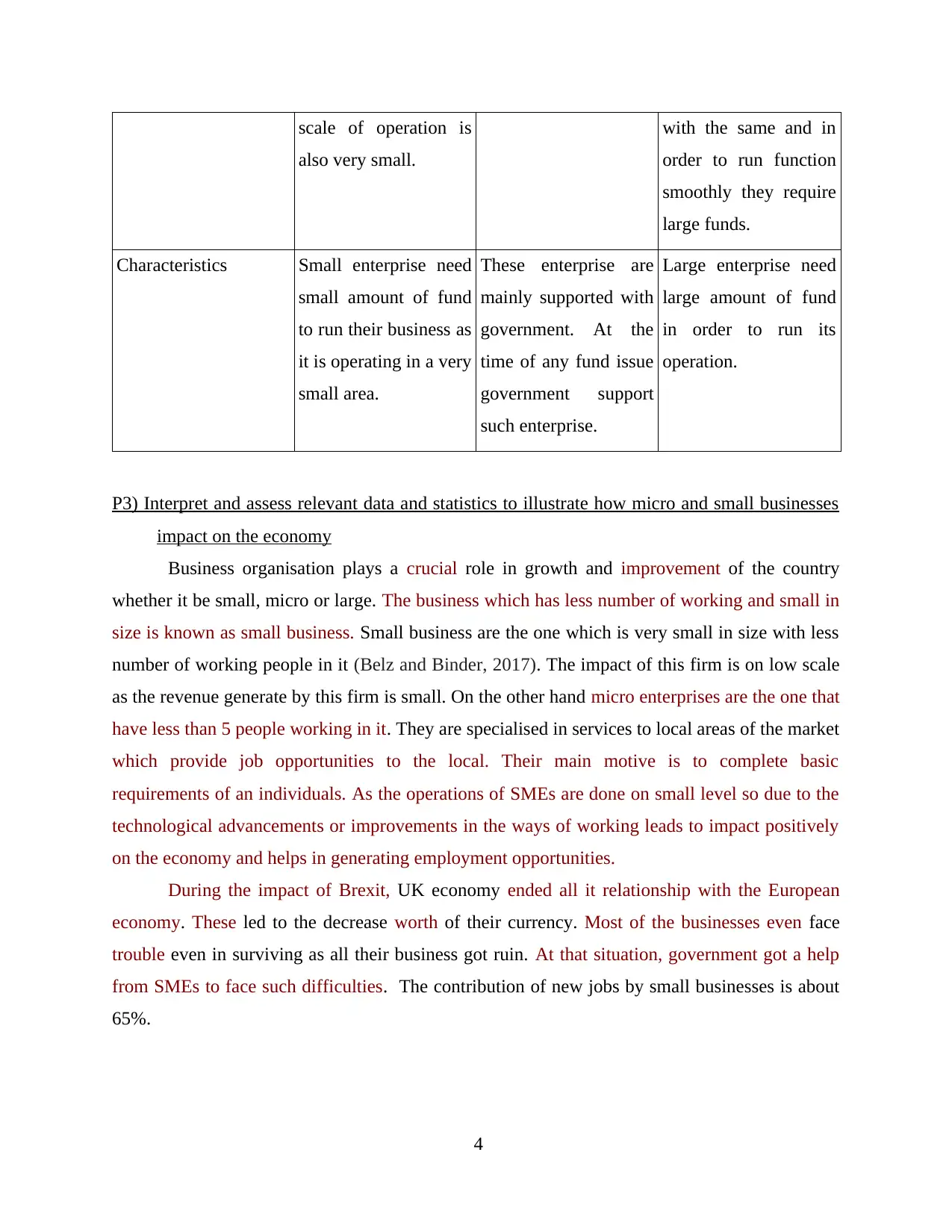
scale of operation is
also very small.
with the same and in
order to run function
smoothly they require
large funds.
Characteristics Small enterprise need
small amount of fund
to run their business as
it is operating in a very
small area.
These enterprise are
mainly supported with
government. At the
time of any fund issue
government support
such enterprise.
Large enterprise need
large amount of fund
in order to run its
operation.
P3) Interpret and assess relevant data and statistics to illustrate how micro and small businesses
impact on the economy
Business organisation plays a crucial role in growth and improvement of the country
whether it be small, micro or large. The business which has less number of working and small in
size is known as small business. Small business are the one which is very small in size with less
number of working people in it (Belz and Binder, 2017). The impact of this firm is on low scale
as the revenue generate by this firm is small. On the other hand micro enterprises are the one that
have less than 5 people working in it. They are specialised in services to local areas of the market
which provide job opportunities to the local. Their main motive is to complete basic
requirements of an individuals. As the operations of SMEs are done on small level so due to the
technological advancements or improvements in the ways of working leads to impact positively
on the economy and helps in generating employment opportunities.
During the impact of Brexit, UK economy ended all it relationship with the European
economy. These led to the decrease worth of their currency. Most of the businesses even face
trouble even in surviving as all their business got ruin. At that situation, government got a help
from SMEs to face such difficulties. The contribution of new jobs by small businesses is about
65%.
4
also very small.
with the same and in
order to run function
smoothly they require
large funds.
Characteristics Small enterprise need
small amount of fund
to run their business as
it is operating in a very
small area.
These enterprise are
mainly supported with
government. At the
time of any fund issue
government support
such enterprise.
Large enterprise need
large amount of fund
in order to run its
operation.
P3) Interpret and assess relevant data and statistics to illustrate how micro and small businesses
impact on the economy
Business organisation plays a crucial role in growth and improvement of the country
whether it be small, micro or large. The business which has less number of working and small in
size is known as small business. Small business are the one which is very small in size with less
number of working people in it (Belz and Binder, 2017). The impact of this firm is on low scale
as the revenue generate by this firm is small. On the other hand micro enterprises are the one that
have less than 5 people working in it. They are specialised in services to local areas of the market
which provide job opportunities to the local. Their main motive is to complete basic
requirements of an individuals. As the operations of SMEs are done on small level so due to the
technological advancements or improvements in the ways of working leads to impact positively
on the economy and helps in generating employment opportunities.
During the impact of Brexit, UK economy ended all it relationship with the European
economy. These led to the decrease worth of their currency. Most of the businesses even face
trouble even in surviving as all their business got ruin. At that situation, government got a help
from SMEs to face such difficulties. The contribution of new jobs by small businesses is about
65%.
4
Paraphrase This Document
Need a fresh take? Get an instant paraphrase of this document with our AI Paraphraser
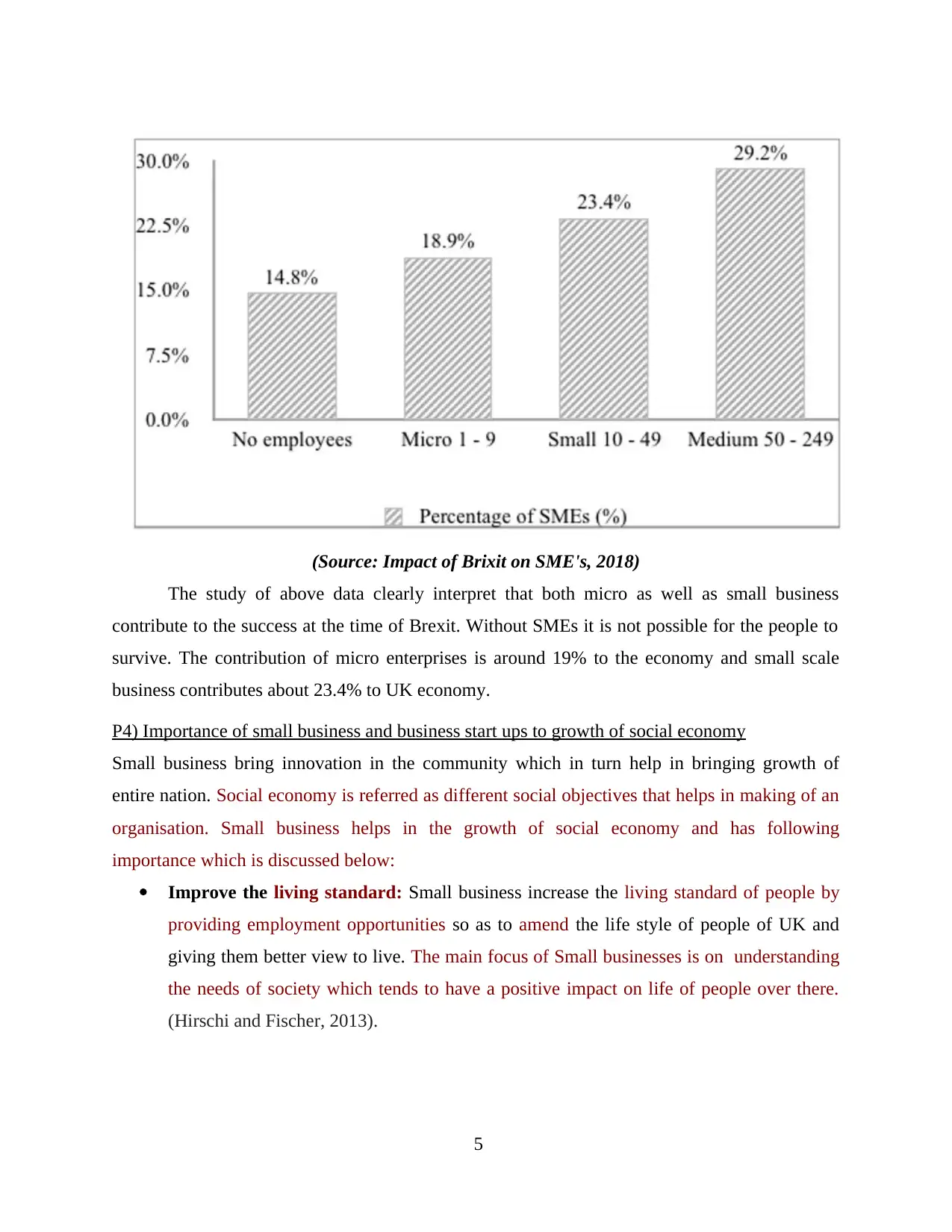
(Source: Impact of Brixit on SME's, 2018)
The study of above data clearly interpret that both micro as well as small business
contribute to the success at the time of Brexit. Without SMEs it is not possible for the people to
survive. The contribution of micro enterprises is around 19% to the economy and small scale
business contributes about 23.4% to UK economy.
P4) Importance of small business and business start ups to growth of social economy
Small business bring innovation in the community which in turn help in bringing growth of
entire nation. Social economy is referred as different social objectives that helps in making of an
organisation. Small business helps in the growth of social economy and has following
importance which is discussed below:
Improve the living standard: Small business increase the living standard of people by
providing employment opportunities so as to amend the life style of people of UK and
giving them better view to live. The main focus of Small businesses is on understanding
the needs of society which tends to have a positive impact on life of people over there.
(Hirschi and Fischer, 2013).
5
The study of above data clearly interpret that both micro as well as small business
contribute to the success at the time of Brexit. Without SMEs it is not possible for the people to
survive. The contribution of micro enterprises is around 19% to the economy and small scale
business contributes about 23.4% to UK economy.
P4) Importance of small business and business start ups to growth of social economy
Small business bring innovation in the community which in turn help in bringing growth of
entire nation. Social economy is referred as different social objectives that helps in making of an
organisation. Small business helps in the growth of social economy and has following
importance which is discussed below:
Improve the living standard: Small business increase the living standard of people by
providing employment opportunities so as to amend the life style of people of UK and
giving them better view to live. The main focus of Small businesses is on understanding
the needs of society which tends to have a positive impact on life of people over there.
(Hirschi and Fischer, 2013).
5
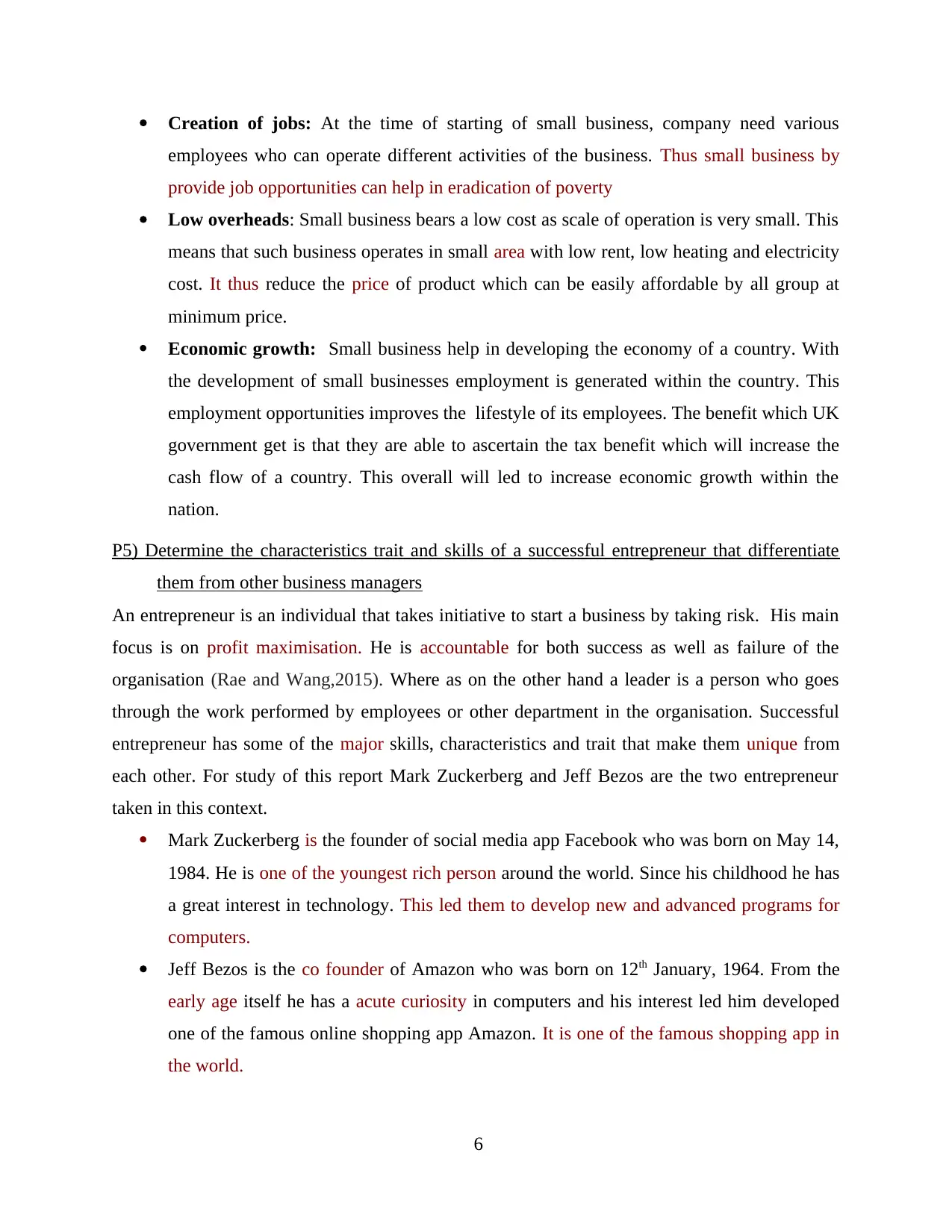
Creation of jobs: At the time of starting of small business, company need various
employees who can operate different activities of the business. Thus small business by
provide job opportunities can help in eradication of poverty
Low overheads: Small business bears a low cost as scale of operation is very small. This
means that such business operates in small area with low rent, low heating and electricity
cost. It thus reduce the price of product which can be easily affordable by all group at
minimum price.
Economic growth: Small business help in developing the economy of a country. With
the development of small businesses employment is generated within the country. This
employment opportunities improves the lifestyle of its employees. The benefit which UK
government get is that they are able to ascertain the tax benefit which will increase the
cash flow of a country. This overall will led to increase economic growth within the
nation.
P5) Determine the characteristics trait and skills of a successful entrepreneur that differentiate
them from other business managers
An entrepreneur is an individual that takes initiative to start a business by taking risk. His main
focus is on profit maximisation. He is accountable for both success as well as failure of the
organisation (Rae and Wang,2015). Where as on the other hand a leader is a person who goes
through the work performed by employees or other department in the organisation. Successful
entrepreneur has some of the major skills, characteristics and trait that make them unique from
each other. For study of this report Mark Zuckerberg and Jeff Bezos are the two entrepreneur
taken in this context.
Mark Zuckerberg is the founder of social media app Facebook who was born on May 14,
1984. He is one of the youngest rich person around the world. Since his childhood he has
a great interest in technology. This led them to develop new and advanced programs for
computers.
Jeff Bezos is the co founder of Amazon who was born on 12th January, 1964. From the
early age itself he has a acute curiosity in computers and his interest led him developed
one of the famous online shopping app Amazon. It is one of the famous shopping app in
the world.
6
employees who can operate different activities of the business. Thus small business by
provide job opportunities can help in eradication of poverty
Low overheads: Small business bears a low cost as scale of operation is very small. This
means that such business operates in small area with low rent, low heating and electricity
cost. It thus reduce the price of product which can be easily affordable by all group at
minimum price.
Economic growth: Small business help in developing the economy of a country. With
the development of small businesses employment is generated within the country. This
employment opportunities improves the lifestyle of its employees. The benefit which UK
government get is that they are able to ascertain the tax benefit which will increase the
cash flow of a country. This overall will led to increase economic growth within the
nation.
P5) Determine the characteristics trait and skills of a successful entrepreneur that differentiate
them from other business managers
An entrepreneur is an individual that takes initiative to start a business by taking risk. His main
focus is on profit maximisation. He is accountable for both success as well as failure of the
organisation (Rae and Wang,2015). Where as on the other hand a leader is a person who goes
through the work performed by employees or other department in the organisation. Successful
entrepreneur has some of the major skills, characteristics and trait that make them unique from
each other. For study of this report Mark Zuckerberg and Jeff Bezos are the two entrepreneur
taken in this context.
Mark Zuckerberg is the founder of social media app Facebook who was born on May 14,
1984. He is one of the youngest rich person around the world. Since his childhood he has
a great interest in technology. This led them to develop new and advanced programs for
computers.
Jeff Bezos is the co founder of Amazon who was born on 12th January, 1964. From the
early age itself he has a acute curiosity in computers and his interest led him developed
one of the famous online shopping app Amazon. It is one of the famous shopping app in
the world.
6
⊘ This is a preview!⊘
Do you want full access?
Subscribe today to unlock all pages.

Trusted by 1+ million students worldwide
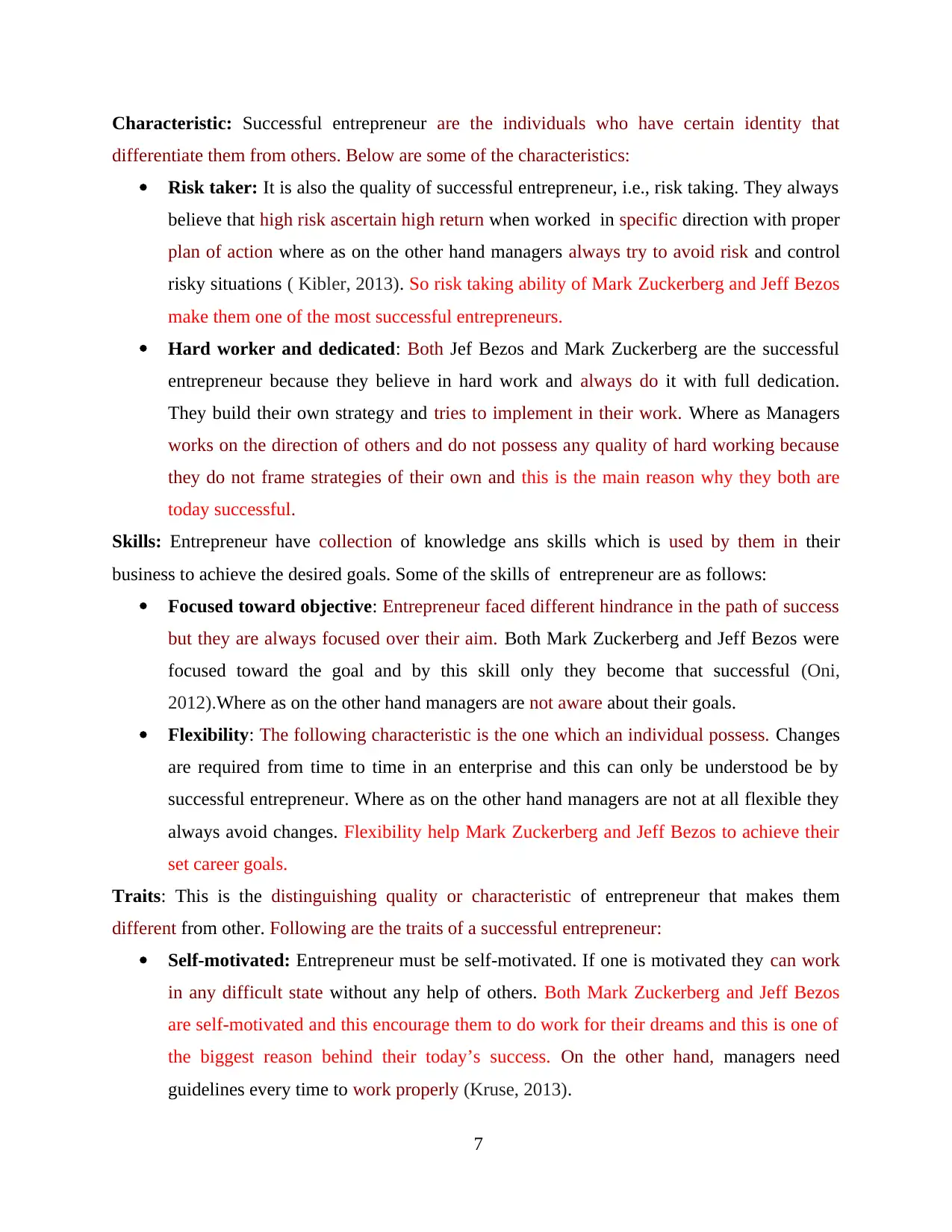
Characteristic: Successful entrepreneur are the individuals who have certain identity that
differentiate them from others. Below are some of the characteristics:
Risk taker: It is also the quality of successful entrepreneur, i.e., risk taking. They always
believe that high risk ascertain high return when worked in specific direction with proper
plan of action where as on the other hand managers always try to avoid risk and control
risky situations ( Kibler, 2013). So risk taking ability of Mark Zuckerberg and Jeff Bezos
make them one of the most successful entrepreneurs.
Hard worker and dedicated: Both Jef Bezos and Mark Zuckerberg are the successful
entrepreneur because they believe in hard work and always do it with full dedication.
They build their own strategy and tries to implement in their work. Where as Managers
works on the direction of others and do not possess any quality of hard working because
they do not frame strategies of their own and this is the main reason why they both are
today successful.
Skills: Entrepreneur have collection of knowledge ans skills which is used by them in their
business to achieve the desired goals. Some of the skills of entrepreneur are as follows:
Focused toward objective: Entrepreneur faced different hindrance in the path of success
but they are always focused over their aim. Both Mark Zuckerberg and Jeff Bezos were
focused toward the goal and by this skill only they become that successful (Oni,
2012).Where as on the other hand managers are not aware about their goals.
Flexibility: The following characteristic is the one which an individual possess. Changes
are required from time to time in an enterprise and this can only be understood be by
successful entrepreneur. Where as on the other hand managers are not at all flexible they
always avoid changes. Flexibility help Mark Zuckerberg and Jeff Bezos to achieve their
set career goals.
Traits: This is the distinguishing quality or characteristic of entrepreneur that makes them
different from other. Following are the traits of a successful entrepreneur:
Self-motivated: Entrepreneur must be self-motivated. If one is motivated they can work
in any difficult state without any help of others. Both Mark Zuckerberg and Jeff Bezos
are self-motivated and this encourage them to do work for their dreams and this is one of
the biggest reason behind their today’s success. On the other hand, managers need
guidelines every time to work properly (Kruse, 2013).
7
differentiate them from others. Below are some of the characteristics:
Risk taker: It is also the quality of successful entrepreneur, i.e., risk taking. They always
believe that high risk ascertain high return when worked in specific direction with proper
plan of action where as on the other hand managers always try to avoid risk and control
risky situations ( Kibler, 2013). So risk taking ability of Mark Zuckerberg and Jeff Bezos
make them one of the most successful entrepreneurs.
Hard worker and dedicated: Both Jef Bezos and Mark Zuckerberg are the successful
entrepreneur because they believe in hard work and always do it with full dedication.
They build their own strategy and tries to implement in their work. Where as Managers
works on the direction of others and do not possess any quality of hard working because
they do not frame strategies of their own and this is the main reason why they both are
today successful.
Skills: Entrepreneur have collection of knowledge ans skills which is used by them in their
business to achieve the desired goals. Some of the skills of entrepreneur are as follows:
Focused toward objective: Entrepreneur faced different hindrance in the path of success
but they are always focused over their aim. Both Mark Zuckerberg and Jeff Bezos were
focused toward the goal and by this skill only they become that successful (Oni,
2012).Where as on the other hand managers are not aware about their goals.
Flexibility: The following characteristic is the one which an individual possess. Changes
are required from time to time in an enterprise and this can only be understood be by
successful entrepreneur. Where as on the other hand managers are not at all flexible they
always avoid changes. Flexibility help Mark Zuckerberg and Jeff Bezos to achieve their
set career goals.
Traits: This is the distinguishing quality or characteristic of entrepreneur that makes them
different from other. Following are the traits of a successful entrepreneur:
Self-motivated: Entrepreneur must be self-motivated. If one is motivated they can work
in any difficult state without any help of others. Both Mark Zuckerberg and Jeff Bezos
are self-motivated and this encourage them to do work for their dreams and this is one of
the biggest reason behind their today’s success. On the other hand, managers need
guidelines every time to work properly (Kruse, 2013).
7
Paraphrase This Document
Need a fresh take? Get an instant paraphrase of this document with our AI Paraphraser
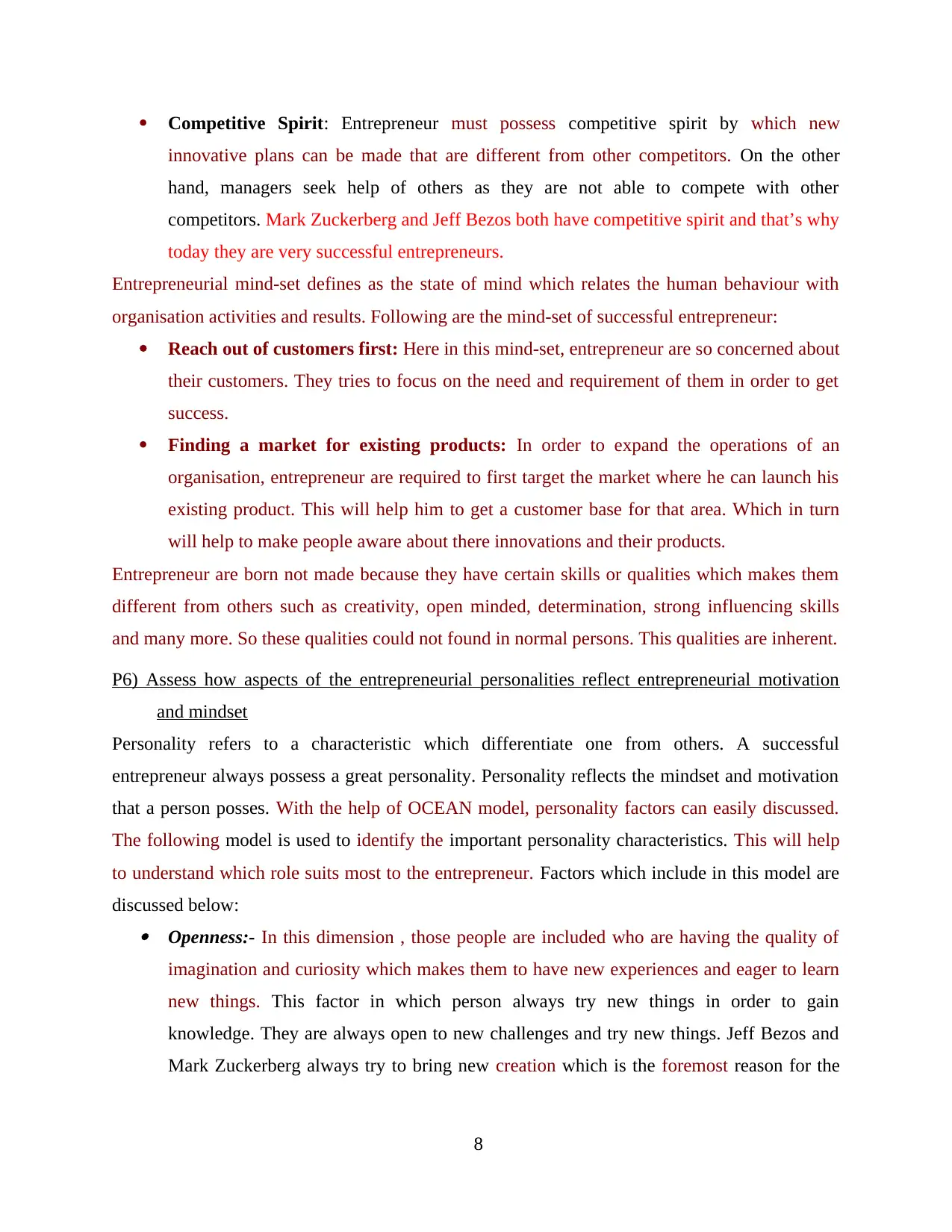
Competitive Spirit: Entrepreneur must possess competitive spirit by which new
innovative plans can be made that are different from other competitors. On the other
hand, managers seek help of others as they are not able to compete with other
competitors. Mark Zuckerberg and Jeff Bezos both have competitive spirit and that’s why
today they are very successful entrepreneurs.
Entrepreneurial mind-set defines as the state of mind which relates the human behaviour with
organisation activities and results. Following are the mind-set of successful entrepreneur:
Reach out of customers first: Here in this mind-set, entrepreneur are so concerned about
their customers. They tries to focus on the need and requirement of them in order to get
success.
Finding a market for existing products: In order to expand the operations of an
organisation, entrepreneur are required to first target the market where he can launch his
existing product. This will help him to get a customer base for that area. Which in turn
will help to make people aware about there innovations and their products.
Entrepreneur are born not made because they have certain skills or qualities which makes them
different from others such as creativity, open minded, determination, strong influencing skills
and many more. So these qualities could not found in normal persons. This qualities are inherent.
P6) Assess how aspects of the entrepreneurial personalities reflect entrepreneurial motivation
and mindset
Personality refers to a characteristic which differentiate one from others. A successful
entrepreneur always possess a great personality. Personality reflects the mindset and motivation
that a person posses. With the help of OCEAN model, personality factors can easily discussed.
The following model is used to identify the important personality characteristics. This will help
to understand which role suits most to the entrepreneur. Factors which include in this model are
discussed below: Openness:- In this dimension , those people are included who are having the quality of
imagination and curiosity which makes them to have new experiences and eager to learn
new things. This factor in which person always try new things in order to gain
knowledge. They are always open to new challenges and try new things. Jeff Bezos and
Mark Zuckerberg always try to bring new creation which is the foremost reason for the
8
innovative plans can be made that are different from other competitors. On the other
hand, managers seek help of others as they are not able to compete with other
competitors. Mark Zuckerberg and Jeff Bezos both have competitive spirit and that’s why
today they are very successful entrepreneurs.
Entrepreneurial mind-set defines as the state of mind which relates the human behaviour with
organisation activities and results. Following are the mind-set of successful entrepreneur:
Reach out of customers first: Here in this mind-set, entrepreneur are so concerned about
their customers. They tries to focus on the need and requirement of them in order to get
success.
Finding a market for existing products: In order to expand the operations of an
organisation, entrepreneur are required to first target the market where he can launch his
existing product. This will help him to get a customer base for that area. Which in turn
will help to make people aware about there innovations and their products.
Entrepreneur are born not made because they have certain skills or qualities which makes them
different from others such as creativity, open minded, determination, strong influencing skills
and many more. So these qualities could not found in normal persons. This qualities are inherent.
P6) Assess how aspects of the entrepreneurial personalities reflect entrepreneurial motivation
and mindset
Personality refers to a characteristic which differentiate one from others. A successful
entrepreneur always possess a great personality. Personality reflects the mindset and motivation
that a person posses. With the help of OCEAN model, personality factors can easily discussed.
The following model is used to identify the important personality characteristics. This will help
to understand which role suits most to the entrepreneur. Factors which include in this model are
discussed below: Openness:- In this dimension , those people are included who are having the quality of
imagination and curiosity which makes them to have new experiences and eager to learn
new things. This factor in which person always try new things in order to gain
knowledge. They are always open to new challenges and try new things. Jeff Bezos and
Mark Zuckerberg always try to bring new creation which is the foremost reason for the
8
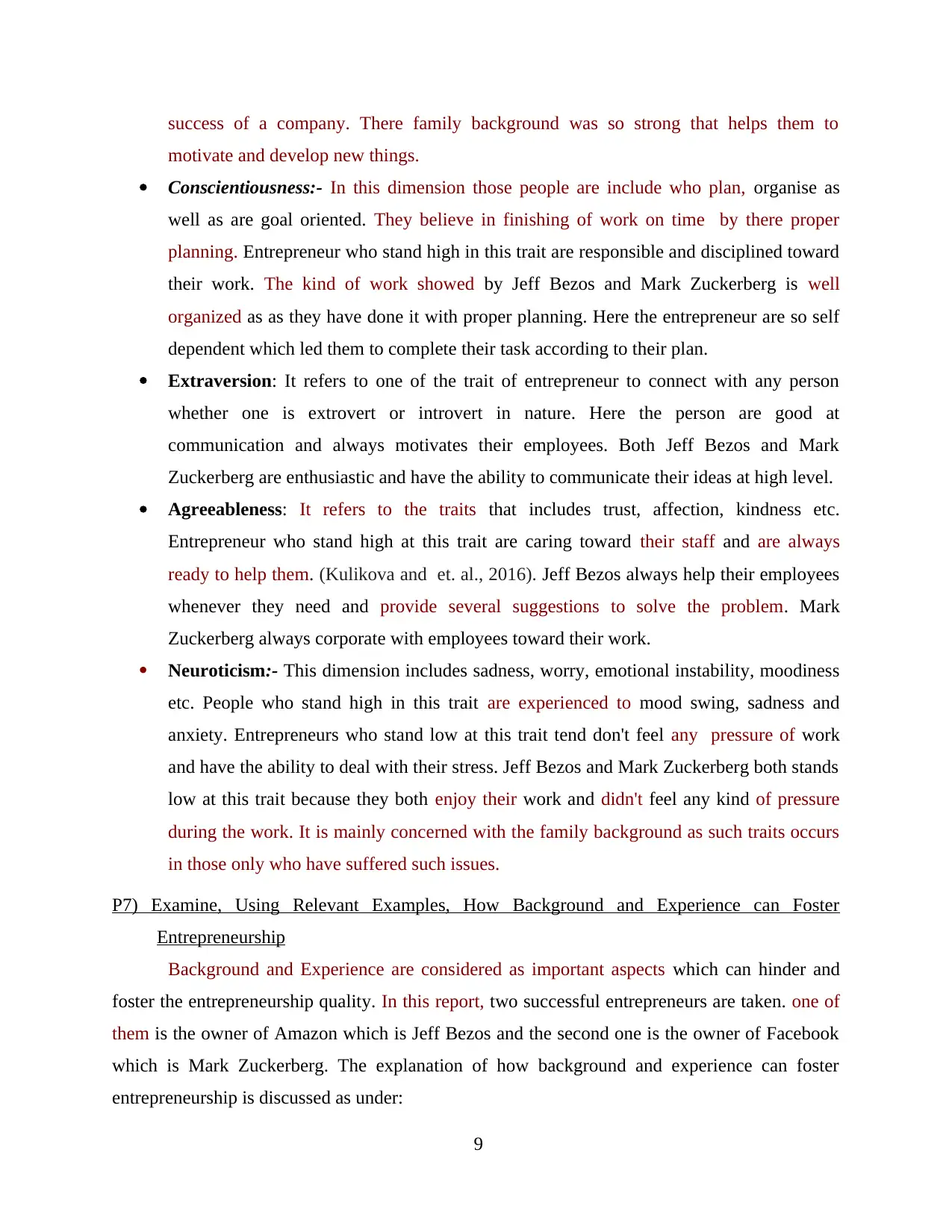
success of a company. There family background was so strong that helps them to
motivate and develop new things.
Conscientiousness:- In this dimension those people are include who plan, organise as
well as are goal oriented. They believe in finishing of work on time by there proper
planning. Entrepreneur who stand high in this trait are responsible and disciplined toward
their work. The kind of work showed by Jeff Bezos and Mark Zuckerberg is well
organized as as they have done it with proper planning. Here the entrepreneur are so self
dependent which led them to complete their task according to their plan.
Extraversion: It refers to one of the trait of entrepreneur to connect with any person
whether one is extrovert or introvert in nature. Here the person are good at
communication and always motivates their employees. Both Jeff Bezos and Mark
Zuckerberg are enthusiastic and have the ability to communicate their ideas at high level.
Agreeableness: It refers to the traits that includes trust, affection, kindness etc.
Entrepreneur who stand high at this trait are caring toward their staff and are always
ready to help them. (Kulikova and et. al., 2016). Jeff Bezos always help their employees
whenever they need and provide several suggestions to solve the problem. Mark
Zuckerberg always corporate with employees toward their work.
Neuroticism:- This dimension includes sadness, worry, emotional instability, moodiness
etc. People who stand high in this trait are experienced to mood swing, sadness and
anxiety. Entrepreneurs who stand low at this trait tend don't feel any pressure of work
and have the ability to deal with their stress. Jeff Bezos and Mark Zuckerberg both stands
low at this trait because they both enjoy their work and didn't feel any kind of pressure
during the work. It is mainly concerned with the family background as such traits occurs
in those only who have suffered such issues.
P7) Examine, Using Relevant Examples, How Background and Experience can Foster
Entrepreneurship
Background and Experience are considered as important aspects which can hinder and
foster the entrepreneurship quality. In this report, two successful entrepreneurs are taken. one of
them is the owner of Amazon which is Jeff Bezos and the second one is the owner of Facebook
which is Mark Zuckerberg. The explanation of how background and experience can foster
entrepreneurship is discussed as under:
9
motivate and develop new things.
Conscientiousness:- In this dimension those people are include who plan, organise as
well as are goal oriented. They believe in finishing of work on time by there proper
planning. Entrepreneur who stand high in this trait are responsible and disciplined toward
their work. The kind of work showed by Jeff Bezos and Mark Zuckerberg is well
organized as as they have done it with proper planning. Here the entrepreneur are so self
dependent which led them to complete their task according to their plan.
Extraversion: It refers to one of the trait of entrepreneur to connect with any person
whether one is extrovert or introvert in nature. Here the person are good at
communication and always motivates their employees. Both Jeff Bezos and Mark
Zuckerberg are enthusiastic and have the ability to communicate their ideas at high level.
Agreeableness: It refers to the traits that includes trust, affection, kindness etc.
Entrepreneur who stand high at this trait are caring toward their staff and are always
ready to help them. (Kulikova and et. al., 2016). Jeff Bezos always help their employees
whenever they need and provide several suggestions to solve the problem. Mark
Zuckerberg always corporate with employees toward their work.
Neuroticism:- This dimension includes sadness, worry, emotional instability, moodiness
etc. People who stand high in this trait are experienced to mood swing, sadness and
anxiety. Entrepreneurs who stand low at this trait tend don't feel any pressure of work
and have the ability to deal with their stress. Jeff Bezos and Mark Zuckerberg both stands
low at this trait because they both enjoy their work and didn't feel any kind of pressure
during the work. It is mainly concerned with the family background as such traits occurs
in those only who have suffered such issues.
P7) Examine, Using Relevant Examples, How Background and Experience can Foster
Entrepreneurship
Background and Experience are considered as important aspects which can hinder and
foster the entrepreneurship quality. In this report, two successful entrepreneurs are taken. one of
them is the owner of Amazon which is Jeff Bezos and the second one is the owner of Facebook
which is Mark Zuckerberg. The explanation of how background and experience can foster
entrepreneurship is discussed as under:
9
⊘ This is a preview!⊘
Do you want full access?
Subscribe today to unlock all pages.

Trusted by 1+ million students worldwide
1 out of 15
Related Documents
Your All-in-One AI-Powered Toolkit for Academic Success.
+13062052269
info@desklib.com
Available 24*7 on WhatsApp / Email
![[object Object]](/_next/static/media/star-bottom.7253800d.svg)
Unlock your academic potential
Copyright © 2020–2025 A2Z Services. All Rights Reserved. Developed and managed by ZUCOL.




